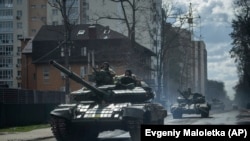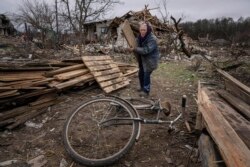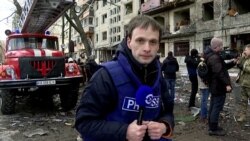On April 13, a Russian Defense Ministry spokesman warned Ukraine of consequences if it hit targets or conducted sabotage on Russian soil.
“We have seen attempts at sabotage and attacks by the Ukrainian military against facilities in Russian territory. If such attempts continue, the Russian Federation’s Armed Forces will strike at the decision-making centers, including Kyiv – something we have so far refrained from,” Maj. Gen. Igor Konashenkov told RT, the Russian state-owned news outlet.
The warning came amid reported strikes on infrastructure critical to Russia’s war effort in its Belgorod region, which shares a 340-mile border with Ukraine’s Luhansk, Kharkiv and Sumy regions.
Ukraine has not confirmed that it conducted such strikes.
In any case, it is false to say Russia has “refrained” from attacking Kyiv. In fact, Russian forces attempted limited operations in the city and there is evidence that Russia planned a “blitzkrieg” attack to capture Kyiv.
The United States, which accurately predicted Russia would invade Ukraine, said it believed that Russia intended to take Kyiv and “decapitate” the government at the onset of the war.
Russian President Vladimir Putin launched the war with the vague goal of de-nazifying Ukraine and halting genocide against Russian speakers there –– a pretext rejected by the International Court of Justice.
A Russian state media article that was published in anticipation of a Russian victory and later deleted prematurely proclaimed that “Ukraine has returned to Russia.”
Taras Kuzio, a political science professor at the National University Kyiv Mohyla Academy, wrote of the article for the Atlantic Council: “The picture that emerges from this chilling text is of the complete military conquest of Ukraine followed by a partition and a massive purge of the civilian population.”
Other Russian state media have pushed for what amounts to the elimination of Ukrainian statehood and culture. Russian President Vladimir Putin has also denied Ukraine’s historical statehood in a misleadingly labeled campaign to “de-nazify Ukraine.”
Russia invaded Ukraine on February 24, attacking the northern, southern and eastern parts of the country. One axis of that strike was aimed at Kyiv.
Two days later, as Russian forces moved in on Kyiv, Ukrainian President Volodymyr Zelenskyy said Ukraine had “derailed” Russia’s plan to overthrow him and establish a puppet state in Ukraine.
Unnamed U.S. defense officials told Reuters that Russia had been “frustrated” by Ukraine’s determined resistance, which slowed the invading Russian force.
There were also reports that Russian saboteurs entered Obolon District six miles north of Ukraine’s parliament building in Kyiv. They were reportedly killed. Russia also reportedly failed to achieve air superiority, hampering efforts for a fast seizure of the Ukrainian capital.
Elite airborne forces led Russia’s assault on Kyiv. Many of the most infamous alleged Russian war crimes occurred during battles in towns outside of Kyiv — Bucha, Irpin and Hostomel. Russia’s failure to take Hostomel (or Antonov Airport) was also crucial to the capital’s survival.
Sebastien Roblin, a journalist specializing in nternational security and history, argued in a piece for the publication 1945 that if Russian forces had successfully seized Antonov Airport, they could have used it to “to land thousands of additional airborne soldiers and their light armored vehicles by cargo plane.”
Then, he wrote, Russian troops could have begun “tightening the noose around the Ukrainian capital even before Russian mechanized armies fought their way in.”
Logistics also failed Russia. Phillips Payson O’Brien, a professor of strategic studies at the University of St. Andrews in Scotland, wrote for The Atlantic magazine that by holding the cities near the borders of Russia and Belarus, Ukraine “made it impossible for Russia to move troops by rail into the Ukrainian heartland.”
Those realities compelled Russian forces to move by road during the muddy season, often in poorly maintained vehicles, leaving long columns open to attack.
Most infamously, a roughly 40-mile-long Russian convoy stalled outside of Kyiv, due to what the BBC and others described as logistical failures, resistance from Ukrainian forces and poor morale among Russian troops.
“The casualties caused by Ukraine’s harassing attacks hampered Russian attempts to build up enough forces to assault Kyiv. Though the Russians tried to advance on three different road systems, from Sumy, Chernihiv, and the northwest, Ukrainian resistance ensured that they never built up enough force to surround, let alone assault, Kyiv,” O’Brien wrote. “All three lines of attack have now been shut down, and Russian forces are in retreat.”
Russian forces that besieged Chernihiv – some 80 miles north of Kyiv – were also unable to advance on Kyiv.
On March 14, U.S. officials said Russian forces had stalled outside of Kyiv, with a “possible effort” to encircle to the city never coming to pass. The culmination of these failures appears to have prompted Russia to scale back its ambitions, Forbes reported.
Some analysts have portrayed these failures as an intentional feint to tie down Ukrainian forces in Kyiv so Russia could advance on the east. Others disagree.
“Regime change is the best explanation for [Russia’s] operation. Once the initial dash failed, Russian forces tried to encircle Kyiv, likely as part of a compellence strategy, but they weren't able to. Now Russia is refocusing on more attainable objectives after sustaining attrition,” Rob Lee, an expert on Russian military policy at the Foreign Policy Research Institute, said on Twitter.
He cited the “very risky” assault on Hostomel, an operation that “makes little sense to just tie down Ukrainian forces.”
“Russia also conducted relatively few missile strikes in Kyiv in the beginning, which you would expect in a feint, and the forces used were too large for this purpose,” Lee wrote.
The Pentagon says Russia is now gearing up for an offensive in the east. That brings into play Russia’s warnings over sabotage.
On April 12, in Russia’s Belgorod region, a railway track roughly four miles from the northeastern Ukrainian city of Kharkiv was seriously damaged in what appears to have been an act of sabotage. On April 1, Russia accused Ukraine of carrying out airstrikes on a fuel depot in Belgorod.
The Kharkiv region borders Luhansk to the east and Donetsk to the southeast. Russia controls portions of Luhansk and Donetsk – located in Ukraine’s historical Donbas region – since fomenting a clandestine war there in 2014.
Belgorod is a major logistics center for Russia’s war effort and is a staging ground for military operations.
Days before Russia’s invasion of Ukraine, Putin recognized the independence of the self-proclaimed Donetsk and Luhansk People’s Republics, which comprise roughly a third of the Donetsk and Luhansk regions.
On March 25, Russia’s military claimed the main objectives had been accomplished in the first stage of its “special military operation” and that 93 percent of the Luhansk region and 54 percent of the Donetsk region were under its control.
But The Associated Press reported that the “failed Russian attempt to storm Kyiv and other big cities took a heavy toll in personnel and equipment.” That has boosted Ukraine forces’ morale while galvanizing international support.
Retired British general Sir Richard Barrons told AP that Russia has “probably lost about 25 percent” of its ground forces in terms of combat effectiveness. “So they’re amalgamating them, they’re refitting them, they’re reinforcing them and then moving them around,” he said. “They’ve had a beating, and they will have only a few weeks to get better.”
According to military analyst Mark Hartling, Russia, despite its claims to the contrary, “will not be able to get the same forces they used in the Kyiv and Kharkiv offensives back into the fight anytime soon.”
“Those forces are depleted. Mauled. Some may fight, but they likely won't be effective,” Hartling tweeted.







